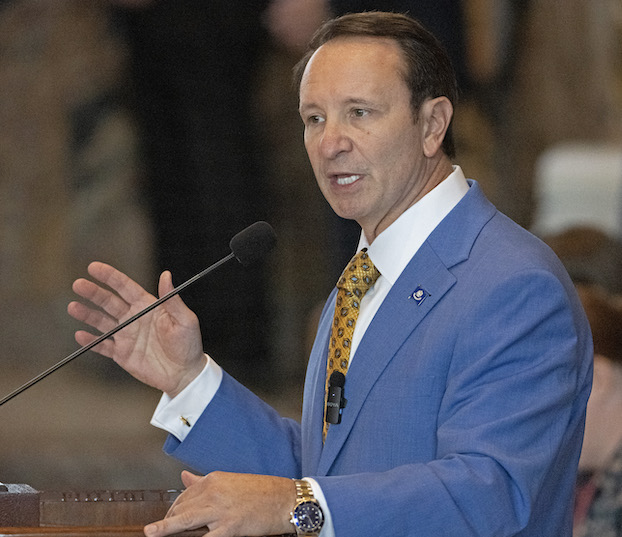Tax reform, other bills advance in first week of special session
Published 9:00 am Monday, November 11, 2024

- Louisiana Governor Jeff Landry speaks in the Louisiana House of Representatives on the opening day of a legislative special session, Wednesday, November 6, 2024, at the Louisiana State Capitol in Baton Rouge, La. (Hilary Scheinuk / The Advocate, Pool)
By Gracelyn Farrar | LSU Manship School News Service
BATON ROUGE — The House Ways and Means Committee took steps Sunday toward achieving the governor’s tax overhaul by advancing a bill to cut the corporate income tax rate, now one of the highest in the nation, in stages from 7.5% to 3.5%.
The full House voted 69-6 to send the plan to the House Appropriations Committee for further consideration.
Also on Sunday, the Ways and Means Committee voted to allow parishes to eliminate the business inventory tax.
If passed by the House and the Senate, any parish that elects to exempt business from the business inventory tax will receive anywhere from $500,000 to $15 million from the state. The inventory tax largely benefits the local parish government.
The inventory tax exemption bill passed 15-2 in committee with Democratic Rep. Mandie Landry and Rep. Matthew Willard, both of New Orleansn in opposition.
Both bills are part of the three-week special session called by Republican Gov. Jeff Landry. Landry’s wants to shift to a 3% flat tax on individual income and cut corporate income taxes. He would try to make up that revenue by reducing other tax breaks, extending part of the state sales tax and adding sales taxes to the cost of 40 services like car washing and pet grooming.
Lobbyists for various industries oppose the loss of their tax breaks, and other critics say the increasing reliance on sales taxes would hurt lower-income people. But state Rep. Chance Henry, R-Crowley, said a comprehensive simplification of tax policy is the practical, common-sense thing to do.
“I think the definition of insanity in the state of Louisiana is what we have done to address the fiscal cliff and our tax code over the last at least 20 years,” Henry said.
The Ways and Means committee also has advanced proposals to double the standard deduction for seniors, provide pay raises for teachers and exempt the purchase of prescription drugs from local sales taxes.
Willard said he opposed the corporate income tax cut because it would allow the state’s economic development officials to decide which corporations get tax breaks or, as he said, “essentially be selecting the winners and losers.”
Secretary Susan Bourgeois of the Louisiana Economic Development agency, which will be making the decisions for tax credits given, referred to the “trust-us factor” in this special session.
“I’m not under any illusion when I sit here and say ‘trust me’, or any of y’all, trust us!” Bourgeois said. “That’s really what we’re telling the market right now.”
Bourgeois compared the corporate income tax change to the corporate tax in North Carolina, which is the lowest in the country. “If we’re looking for a track record, let’s look at other states who do it like this,” she said.
Referring to luring new employers and business investment, Louisiana Secretary of Revenue Richard Nelson, who is overseeing the governor’s plan, said: “It’s hard to attract people when you have literally the highest rate in the South.”
Nelson and Landry have held private meetings with legislators and special interest groups in an effort to get the bills passed. The state is heading for a fiscal cliff next year, thanks to the expiration of both the 0.45% state sales tax and a 2% business utilities tax in June.
Much of the Landry strategy is to cut rates for individuals and corporations and to reduce or eliminate business tax exemption. He also wants to broaden sales tax collections.
One hot topic is the removal of the tax credit for historic structures. Lobbyists took turns defending to lawmakers that restoration of historic structures eliminates blight and oftentimes cannot happen without those credits. The planned renovation of the U.S. post office in Ruston, which is listed on the National Register of Historic Places, was cited as an example.
“There are things like this that are hard to put a number on,” Rep. Landry said, “because you’re not rehabilitating a house from the 1800s to make money off it. You’re doing it because you want to keep those structures, you know, maybe movies will be filmed. Maybe just to keep the structure of the neighborhood or of the city.”
Rep. Marcus Bryant, D-New Iberia, said he was concerned about the removal of the historic tax credit and the authority of economic development officials to divvy out credits. “Now, you’re the gatekeeper for who is getting the credit and who is getting an incentive,” he said.





